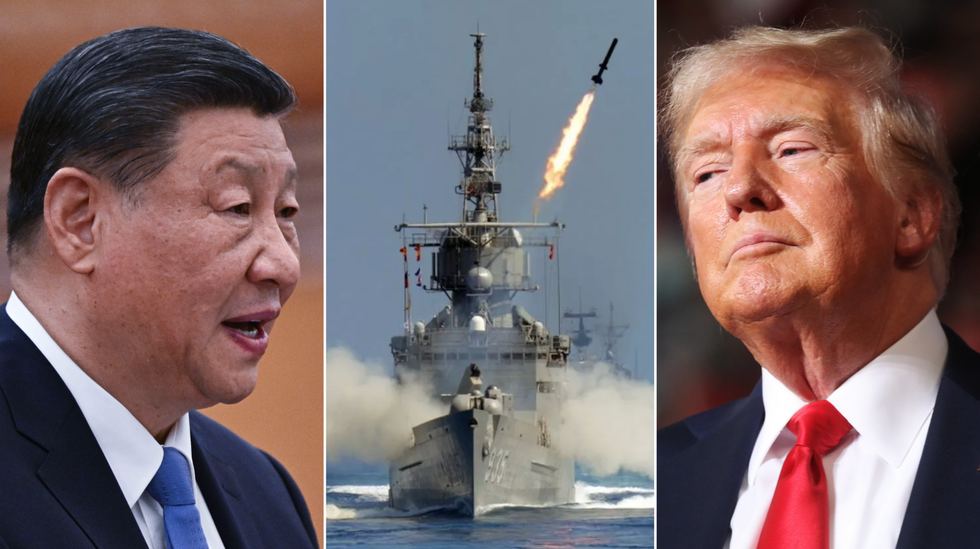Sino-American relations are about to turn nasty
Don't Miss
Most Read
Trending on GB News
The term 'assassin's mace' has its roots in ancient Chinese folklore, although today it can regularly be found in Beijing's military documents.
The concept describes how a seemingly inferior power can defeat a superior one with an asymmetrical weapon - a Trump card, so to speak.
Within the context of Sino-American relations, it applies to the strategies China has up its sleeve that could blunt America's edge in a wide array of industries..
The term has grown more salient after Donald Trump announced 10 per cent tariffs on all Chinese imports earlier this month.
So far, Xi Jinping's response has been muted, slapping 10 to 15 per cent tariffs on a range of US products.
However, he has put far more destructive weapons on standby as the spectre of a trade war looms.
Here are five ways America could come to regret slapping tariffs on China.
Export Controls on critical minerals
In addition to slapping tariffs on US imports, China has implemented export controls on minerals that the US Geological Survey (USGS) deem critical, meaning they are essential to US economic or national security.
Germanium, gallium, and antimony are vital for advanced technological manufacturing and military applications.
These rare minerals power everything from radars to smartphone chargers and the computer chips that train artificial intelligence.
By restricting these exports, China can disrupt supply chains in the US and allied nations, potentially hobbling their technological and defence sectors.
In a recent report, the USGS assessed the economic impact of potential supply disruptions.
The study determined a full ban on gallium, which the US has not produced since 1987, could reduce GDP by as much as $3.1billion, while a ban on germanium could cost $0.4billion.

China could hobble America's dominance in a full-scale trade war
Getty Images
AI supremacy
Critical minerals are vital for manufacturing semiconductors, the backbone of AI hardware.
Gallium, for example, is used in high-performance microchips, essential for AI applications, while germanium is used in solar cells and fiber optics, supporting AI data centers. The restrictions could lead to shortages or increased costs for these materials, thereby hampering chip production.
Export controls on critical minerals could, therefore, blunt America's edge in AI.
Adding to the anxiety in Washington is the unexpected arrival of a new AI model from an obscure Chinese startup, which has spooked global financial markets as it has proven cheaper and more powerful than America's models.
DeepSeek uses knowledge distillation and model pruning to shrink large models while retaining accuracy. This makes their models run efficiently on low-power devices, which is a key advantage over companies that may rely on more resource-intensive models.
This makes it more scalable than current US offerings at a time when the two countries are vying for supremacy in this space.
Analysts in Washington worry that Trump's tariffs could spur on China's efforts to dominate in this field, particularly as it closes the gap in terms of R&D investment in AI.
It's also leading the way in scientific research.
In 2020, for example, China produced the largest volume of Science and Engineering publications worldwide (23 per cent of global output), followed by the US.
Retaliatory tariffs
The US is far more dependent on China than meets the eye.
That's because conventional metrics - which show that America buys more from China than it sells - give the impression of a direct reliance on Uncle Sam.
However, a recent study by IMD Business School Professor Richard Baldwin and his colleagues revealed that US manufacturers depend on Chinese inputs embedded within goods imported from other countries. This indirect exposure is significantly larger than previously recognised.
By analysing global input-output data, Baldwin and his co-authors estimate that the actual US exposure to Chinese suppliers is nearly four times greater than standard calculations indicate.
This should worry many analysts in Washington as China has announced a salvo of tariffs in response to Trump's escalation, implementing a 15 per cent tariff on coal and liquefied natural gas products as well as a 10 per cent tariff on crude oil, agricultural machinery and large-engine cars imported from the US.
"A risk is that this is the beginning of a tit-for-tat trade war, which could result in lower GDP growth everywhere, higher U.S. inflation, a stronger dollar and upside pressure on U.S. interest rates,” Stephen Dover, chief market strategist and head of the Franklin Templeton Institute, a financial research firm, told AP.
Diversifying trade routes
China is actively seeking to strengthen trade relationships with other countries, reducing its reliance on its largest trading partner.
By forming new alliances and entering alternative markets, China can mitigate the impact of US tariffs and lessen the leverage of Western economic policies.
This shift allows China to pursue its economic objectives with greater autonomy, potentially sidelining US interests.
This decoupling also risks undermining Europe's competitiveness as China will flood the continent with cheap products that were bound for America.
LATEST MEMBERSHIP DEVELOPMENTS
Create an alternative to the dollar
Trump's tariffs could motivate China and the other BRICS nations (Brazil, Russia, India and South Africa) to wean themselves off the dollar for good and move toward bilateral trade settlements using their respective currencies.
For example, Brazil and China already trade in their local currencies for some transactions.
As the world’s largest exporter, China stands to benefit the most. It could use its trade power to promote the yuan among emerging economies.
The BRIC nations could create a system similar to SWIFT (the global messaging system for cross-border payments) to bypass US financial sanctions or tariffs.
Russia has already developed the SPFS system to bypass Western sanctions in response to the invasion of Ukraine, and China operates its own Cross-Border Interbank Payment System (CIPS). Combining these systems could form a BRIC-led global payment alternative.
By promoting de-dollarisation, bypassing US-led financial systems, and enhancing economic cooperation, BRICS could erode America's ability to leverage its economic and financial power globally.









